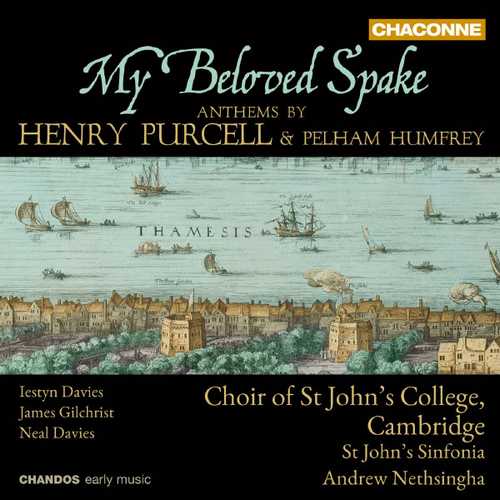

Composer: Henry Purcell, Pelham Humfrey
Performer: John Challenger, James Gilchrist, Neal Davies, Peter Hicks, James Imam, Alec D’Oyly, Tom Blackie, Huw Leslie, Julian Gregory, Choir of St John’s College Cambridge
Orchestra: St. John’s Sinfonia
Conductor: Andrew Nethsingha
Format: FLAC (tracks)
Label: Chandos
Catalogue: CHAN0790
Release: 2012
Size: 838 MB
Recovery: +3%
Scan: yes
01. Purcell: Remember not, O Lord, our offences, Z50
02. Purcell: Jehova, quam multi sunt hostes mei, Z135
03. Purcell: O sing unto the Lord, Z44
04. Humfrey: O Lord my God
Humfrey: Magnificat and Nunc dimittis in E minor from Evening Service
05. Magnificat
06. Nunc dimittis
07. Purcell: Behold now, praise the Lord, Z3
08. Purcell: My beloved spake, Z28
09. Purcell: Hear my prayer, O Lord, Z15
10. Purcell: Rejoice in the Lord alway (‘The Bell Anthem’), Z49
Established in the 1670s, the Choir of St John’s College, Cambridge is today one of the finest college choirs in the world, known and loved by millions for its recordings and concert tours. On this album, the Choir and St John’s Sinfonia, conducted by Andrew Nethsingha, perform works by Henry Purcell and Pelham Humfrey. They are joined by four soloists: Iestyn Davies, James Gilchrist, David Stout, and Neal Davies.
Humfrey was an English composer of the seventeenth century, known mainly for his verse anthems. Being well travelled, he produced works that in their vocal character show the influence of Italian music, and in the instrumental writing that of French music. That said, from these major foreign influences Humfrey forged a personal style that is uniquely English. Although as a composer he was generally forward-looking, his music also shows sub-elements of the English Golden Age of yesteryear. O Lord my God, for instance, is influenced by John Dowland’s celebrated Lachrimae Pavan of almost eighty years earlier.
In contrast, the Magnificat and Nunc dimittis were composed simply to be liturgically appropriate, with a text setting that is naturalistic and direct. Humfrey died at the age of twenty-seven, but even at this young age, he exerted a strong influence on his peers, including Henry Purcell, who as a young boy sang treble in Humfrey’s Chapel Royal Choir.
The works by Purcell recorded here range from works written when the composer was in his teenage years (Jehova, quam multi sunt hostes mei being a masterly example) to the crowning glory of the recording, O sing unto the Lord, which Purcell wrote when he was in his thirties, and compositionally on fire. At this stage of his career no other composer could touch him. Instruments and voices sing from the same hymn sheet, form and content are inseparable, past and present musical styles seamlessly intermingle, technique and virtuosity are indistinguishable from each other – and soloists and choir mesh together in a dazzling and life-affirming way.
The Anglican anthem is an elaborate, often festive polyphonic form roughly comparable to the motet from Continental countries. With strong liturgical connections, the anthem of the late 17th century tends to contain conservative elements, and so it is with this collection of anthems by Henry Purcell and his slightly older contemporary, Pelham Humfrey (1647-1674, meaning that he died at an even younger age than Purcell did). In Purcell there are such elements as the striking half-step dissonances in Remember not, Lord, our offences, Z. 50 (track 1). The two works by Humfrey include up-to-date dramatic solo writing combined with choral polyphony that harks back to the 16th century. It’s an appealing and unusual combination from a rarely heard composer, and the presence of the two Humfrey works is the main attraction of this release. The booklet seems to concede as much with its heading of “Humfrey/Purcell: Anthems,” even though the vast majority of the music is by Purcell. When it comes to Purcell, you can do better. The sound, usually a Chandos strong point, is unaccountably muddy, and good luck even to native English speakers in understanding the texts of these works, where text is important. The soloists, especially bass Neal Davies in the beautifully dark O Lord my God of Humfrey, are engaging, but the boys’ Choir of St. John’s College, Cambridge, is a bit uncertain in higher registers and seems somehow overmatched by the music. Worthwhile for those with an interest in English music of the 17th century, for the performances of the unusual Humfrey pieces are also the strongest on the album.